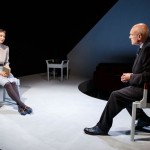Robert Tanitch reviews ENO’s Rodelinda at London Coliseum
Handel’s Rodelinda premiered in London in 1725. If you are looking for something Baroque, forget it. If you are looking for a political drama in the correct period (7th century AD) forget it. The action is set in a post-World War 2 Fascist Italy.
Queen Rodelinda (Rebecca Evans) thinks her husband, King Bertarido (Istyn Davies), is dead. Grimoaldo (John Mark Ainsley), a love-sick pervert, who has usurped the throne, offers to marry her. But Bertarido is not dead and has returned home in disguise to see how faithful his wife is.
How long will it be before she realizes he is alive and who will murder whom first? There is farcical scene when Grimoaldo keeps going into the next room to find a different weapon and fails to kill Bertarido each time.
Richard Jones, the director, is not afraid to play for laughs throughout. The set has enough doors to slam shut as any farce by Ray Cooney.
 The six singers are invariably upstaged when they are singing an aria. There is always some distraction going on elsewhere in the ugly multiple set. The cast is provided with three walking machines so that they can keep fit. Christopher Ainslie, as Bertarido’s best mate (and like him, also a counter tenor) shows off with a somersault whilst on the move.
The six singers are invariably upstaged when they are singing an aria. There is always some distraction going on elsewhere in the ugly multiple set. The cast is provided with three walking machines so that they can keep fit. Christopher Ainslie, as Bertarido’s best mate (and like him, also a counter tenor) shows off with a somersault whilst on the move.
Rosalinda is the sort of tough Italian lady who, when offered an expensive white fur wrap as a present, pours coffee all over it. There is a memorable scene when she lifts up her bed so that it is standing upright and reveals her son strapped to it underneath. She tells Grimoaldi she will marry him only if he kills her son. Will her bluff be called? Grimoaldi is the sort of tyrant who can sing an aria whilst his back is being tattooed, but he is basically a coward.
One of Hudson’s innovations is to turn Rodelinda’s son, a little boy, into a fully grown young man. It’s a non-singing role but actor Matt Casey (in his West End debut) is given plenty to do, not least when he has to comically sign language everything his mother is threatening to do to the villainous Garibaldo.
Handel is great. The singing is great. Davies is tremendous in his final aria. The conductor is Christian Curnyn.
To learn more about Robert Tanitch and his reviews, click here to go to his website




